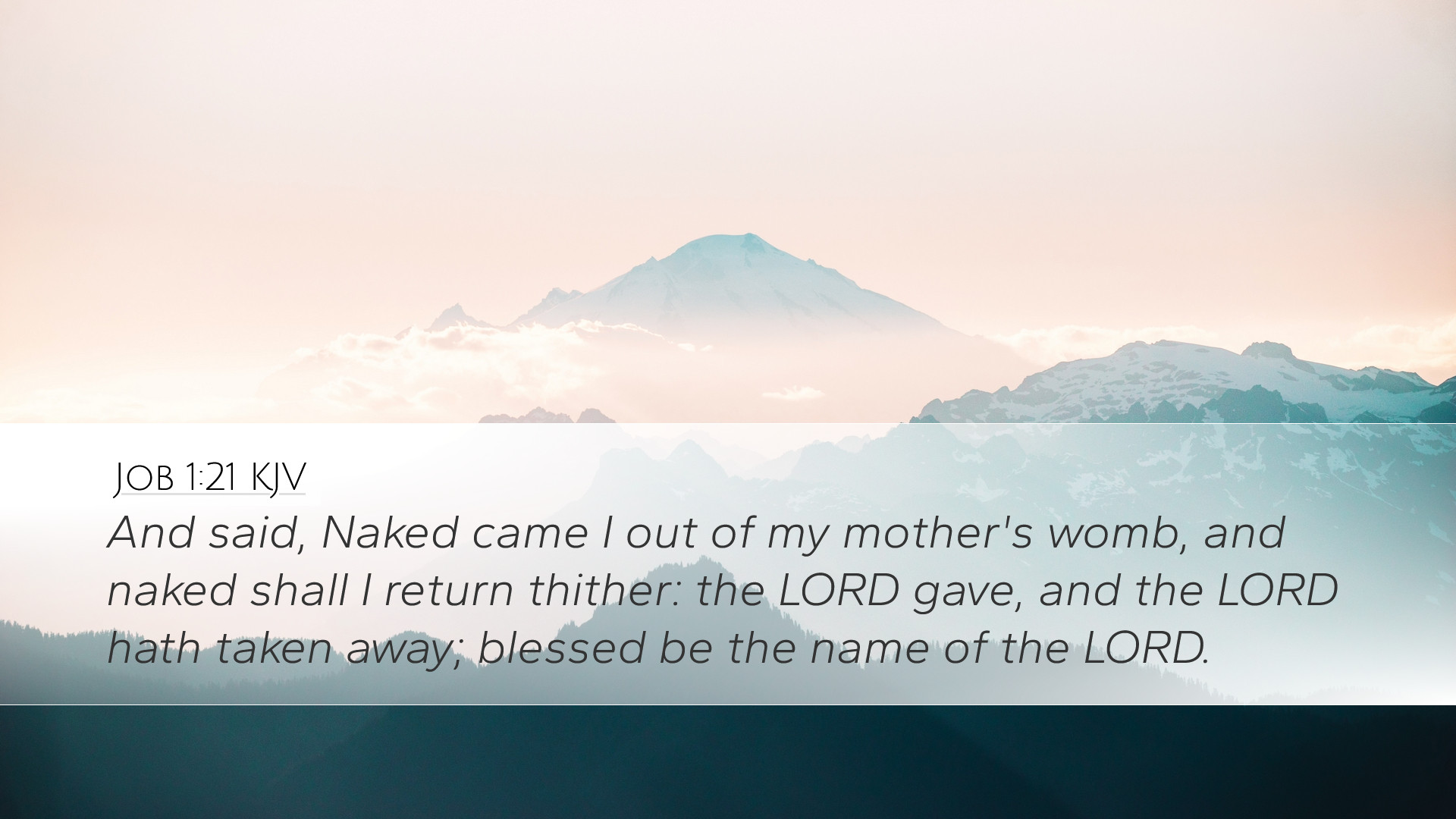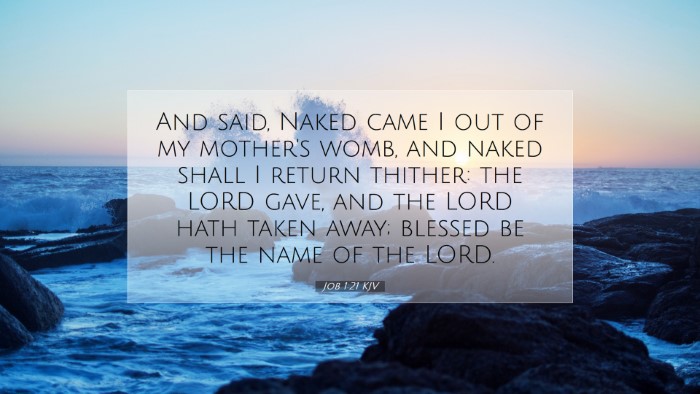Old Testament
Genesis Exodus Leviticus Numbers Deuteronomy Joshua Judges Ruth 1 Samuel 2 Samuel 1 Kings 2 Kings 1 Chronicles 2 Chronicles Ezra Nehemiah Esther Job Psalms Proverbs Ecclesiastes Song of Solomon Isaiah Jeremiah Lamentations Ezekiel Daniel Hosea Joel Amos Obadiah Jonah Micah Nahum Habakkuk Zephaniah Haggai Zechariah MalachiJob 1:21
Job 1:21 KJV
And said, Naked came I out of my mother's womb, and naked shall I return thither: the LORD gave, and the LORD hath taken away; blessed be the name of the LORD.
Job 1:21 Bible Commentary
Commentary on Job 1:21
Job 1:21: "And said, Naked came I out of my mother's womb, and naked shall I return thither: the Lord gave, and the Lord hath taken away; blessed be the name of the Lord."
Introduction
This verse encapsulates Job's profound response to the devastating losses he experienced. It serves as a testament to his faith in God amidst unimaginable suffering. Commentators such as Matthew Henry, Albert Barnes, and Adam Clarke provide in-depth insights into the theological and practical implications of Job's proclamation.
The Context of Job 1:21
Job, described as blameless and upright, faced a sudden onslaught of calamity—loss of wealth, children, and health. The context of this verse situates Job in a moment of deep despair, yet his response reflects a remarkable acceptance of God’s sovereignty.
Analysis of Key Phrases
- "Naked came I out of my mother's womb":
Matthew Henry notes this phrase illustrates the fundamental lack of material possession humans have at birth. It emphasizes our origins and the temporality of worldly possessions.
- "and naked shall I return thither":
Adam Clarke comments on the inevitability of death, underscoring the fact that we leave behind all earthly gains. This reminds believers of their ultimate return to God.
- "the Lord gave, and the Lord hath taken away":
Albert Barnes elaborates on God's sovereignty, suggesting that both blessings and trials come from Him. This statement declares God's control over every circumstance in life.
- "blessed be the name of the Lord":
This phrase is a declaration of worship and submission. Henry emphasizes that despite grief, Job maintained his reverence for God, exemplifying true faith.
Theological Implications
Job's response reflects profound theological truths regarding the nature of God and human existence.
-
The Sovereignty of God:
Job acknowledges God's ultimate authority over life and death, which speaks to the core belief that God is in control of all events.
-
The Nature of Worship:
Job’s ability to worship in the face of adversity showcases a model for believers on the importance of maintaining faith during trials.
-
The Mystery of Suffering:
This verse invites contemplation on the purpose of suffering and how it can coexist with a faithful life. Clarke argues that suffering is sometimes allowed by God for reasons beyond human understanding.
Practical Applications
For pastors, students, and believers, Job 1:21 provides several meaningful applications:
-
Embracing Vulnerability:
Understanding our human condition—entering and departing this world without material gain—encourages humility and reliance on God.
-
Cultivating Praise in Trials:
Job’s declaration teaches that praising God should not be conditional on our circumstances. It serves as a model for believers faced with difficulties.
-
Strengthening Faith:
This verse invites introspection on how we view ownership and control. Maintaining an eternal perspective can lead to a deeper, more resilient faith.
Conclusion
Job 1:21 stands as a powerful statement of faith amidst suffering. The insights of Matthew Henry, Albert Barnes, and Adam Clarke offer a multifaceted understanding of this verse, emphasizing God's sovereignty, worship, and the complex nature of suffering. For pastors, students, and theologians, this scripture challenges us to reflect on our own responses to loss and to reaffirm our trust in God's perfect will, even when it is beyond our understanding.


